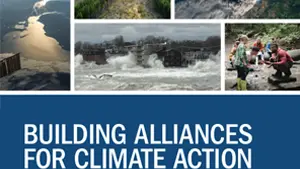 Building Alliances for Climate Action is a guide that provides resources, insights, and stories to help people and organizations address climate change. It was developed by NASA and the Federal Emergency Management Agency (FEMA) in collaboration with the Resilient Nation Partnership Network (RNPN). The guide was created after the Alliances for Climate Action, a virtual series co-hosted by NASA and FEMA in 2021. The series featured 37 speakers who shared their perspectives on how to increase collective climate action.
Building Alliances for Climate Action is a guide that provides resources, insights, and stories to help people and organizations address climate change. It was developed by NASA and the Federal Emergency Management Agency (FEMA) in collaboration with the Resilient Nation Partnership Network (RNPN). The guide was created after the Alliances for Climate Action, a virtual series co-hosted by NASA and FEMA in 2021. The series featured 37 speakers who shared their perspectives on how to increase collective climate action.
The guide includes resources to help people and organizations adapt to and mitigate the effects of climate change. It aims to provide a unifying voice and help people find direction on how to address the climate crisis.
Some tips for building a high-impact sustainability alliance include:
- Translating guiding principles into clear standards for products and operations
- Supporting standards with measurement methodologies
- Regularly reporting on progress
- Taking a portfolio approach to ensure innovation focuses on both near-term and long-term sustainability solutions
Click here to view the resource.




